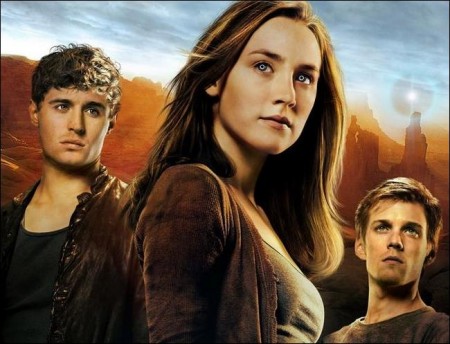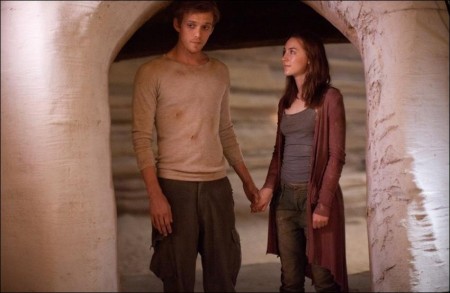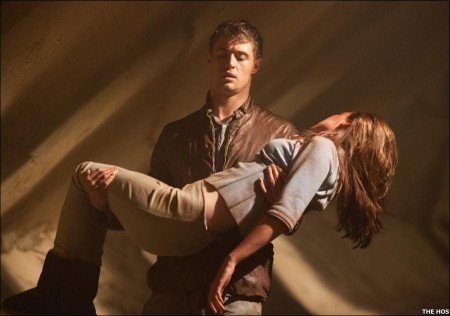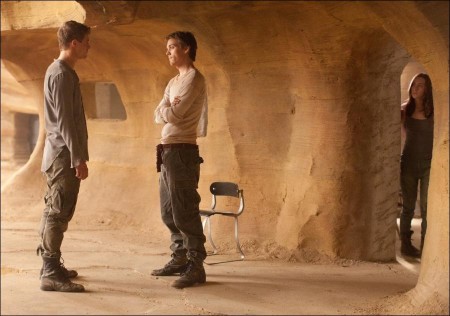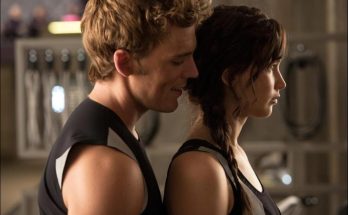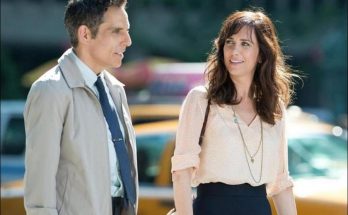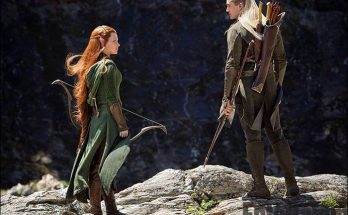Taglines: Choose your destiny.
A riveting story about the survival of love and the human spirit in a time of war. Our world has been invaded by an unseen enemy. Humans become hosts for these invaders, their minds taken over while their bodies remain intact. Most of humanity has succumbed.
Our world has been invaded by an unseen enemy. Humans become hosts for these invaders, their minds taken over while their bodies remain intact and continue their lives apparently unchanged. Most of humanity has succumbed.
When Melanie, one of the few remaining “wild” humans is captured, she is certain it is her end. Wanderer, the invading “soul” who has been given Melanie’s body, was warned about the challenges of living inside a human: the overwhelming emotions, the glut of senses, the too vivid memories. But there was one difficulty Wanderer didn’t expect: the former tenant of her body refusing to relinquish possession of her mind.
About the Production (2013)
Stephenie Meyer was driving through the seemingly endless desert that stretches from Phoenix to Salt Lake City when she came up with the idea for her best-selling novel, The Host. Meyer, whose record-breaking Twilight series was just becoming a worldwide phenomenon, passed the long hours by telling herself stories. “I came on the idea of two personalities in one body,” she says. “They are both in love with different people, which creates a great deal of conflict. I like messy relationships. They’re fun to work through.”
The popular author also enjoys exploring the idea of love, but in this case, not just romantic love. “There’s maternal love, which is such a big part of my life,” says Meyer. “There’s love of community and the people you belong with. I asked myself, what happens when you love someone and that makes you a traitor to your people? Love makes you do things you wouldn’t do otherwise. It creates conflict and disorder.”
As the story began to take shape, it rooted itself in the desert she was travelling though. “I kept thinking about the things we take for granted: that we can see, how we can walk around, how we taste and hear.”
As Meyer expanded on her original concept, she began constructing a more serious, deeper story than she had in any of her previous novels. “The Twilight books are about romantic love and the way it makes you feel at 17 or 18,” she notes. “There’s nothing else in the world. You would do anything and be anything for love. That’s a fun place to visit as a fantasy.
“The Host is about finding balance in life,” she continues. “Certainly there’s romance, but it is a much more grown-up and realistic story, aside from the science-fiction elements.”
But the sci-fi elements do set the stage for the story in The Host. “The world has been invaded Body Snatcher-style,” explains Meyer. “These new entities, who call themselves the Souls, are a very peaceful, harmonious, homogenous group. They fix many of the problems of our world. There’s no more hunger, no more disease or fear or violence. No one lies or cheats or steals. The idea that a stranger might harm you doesn’t even exist anymore.”
The handful of humans who have not been taken over by the Souls are understandably unable to see the beauty in a utopia in which most of their loved ones are gone. “They’ve lost everything, including the people most important to them,” Meyer says. “But this story is told from the perspective of Wanda, one of the aliens, which is rarely the way it has been approached before.”
The Host was published in 2008 and spent 26 weeks at No. 1 on The New York Times bestseller list and 36 weeks on the Los Angeles Times bestseller list.
Producer Nick Wechsler recalls getting a call from Meyer’s agent asking if he was interested in putting together a film based the material. “I’m an avid sci-fi fan, so I jumped at the chance to read it. The theme, the characters and the conceit of the book leaped out at me. What I didn’t understand was why a best-selling book by Stephenie Meyer hadn’t already been bought.”
What he discovered was that conventional wisdom in the film industry dictated that it would be difficult, if not impossible, to make a realistic film in which two characters shared one body. “It never seemed like a huge challenge to me or to Nick,” says Meyer. “We figured all we needed was a really fantastic actress.”
Based on Wechsler’s history of making acclaimed adaptations of other novels, including Requiem for a Dream, The Time Traveler’s Wife and The Road, Meyer believed he could be counted on to make the best possible movie version of the book. “Just look at his track record,” she says. “He finds books that he loves and translates them as meticulously as he can to the screen. He was a dream to work with because he wanted the same things I wanted.”
Wechsler approached Steve and Paula Mae Schwartz of Chockstone Pictures to partner with Meyer and him as the film’s producers. “When Steve, Paula Mae and I do a project together, we develop it with our own money,” he says. “That gives us more creative control, which was extremely appealing to Stephenie. We agreed that we would treat this property with care and make an epic adventure, not just a popcorn movie.”
The Schwartzes were excited by The Host’s delicate balance of romance and speculative fiction. “There’s a human element to this story that we felt we don’t often see in sci-fi,” says Paula Mae Schwartz. “The relationship between Melanie and Wanda explores love and jealousy and the difficulty of change. Forced to share a body, each one gains something from the other and ultimately becomes a better version of herself.”
When the producers began the process of selecting a screenwriter and a director, Wechsler asked Meyer about her favorite science fiction movies. “I told him that my number one is Gattaca,” she says. “I love that it’s not about gadgets and lasers and fighting robots. It’s about humanity, not how cool a space ship can be designed in CGI. We are transported into a world other than our own, but one that we can imagine ourselves in because of the performances and the story.”
As it happened, Wechsler has a longstanding relationship with Andrew Niccol, Gattaca’s writer and director. “Stephenie liked the rhythm of the way the characters spoke and the style in which Gattaca is directed,” he says. “I love Andrew’s taste and his vision.”
The Host, with its seething inner conflict, seized the director’s imagination right away. “You can talk about characters in roles having inner conflict, but in this case it is literally true,” says Niccol. “Our main character has been inhabited by an alien being. The two personalities go to a war with one another. It’s a great concept.”
Niccol observes that science fiction offers a subtle way to deliver a message to an audience. “It’s almost easier to say something about today by going into a future period,” he notes. “It’s a Trojan Horse of sorts. The audience is thinking that if it’s about the future it has nothing to do with them and then you slip an idea to them.”
Niccol agreed to direct the film, as well as to write the screenplay based on Meyer’s novel. “Obviously I was aware of the popularity of Twilight,” he says. “But I simply wanted to do justice to the book and its fans. Any pressure I felt was more creative than commercial. The idea of catching lightning in a bottle twice is a little much to expect. On the other hand, I wouldn’t bet against Stephenie.”
Having been through the adaptation process several times before, Meyer came to the table with strong opinions about what the final script should look like. “Any adaptation is 95 percent compromise and 5 percent frustration,” she says. “I believe that everyone on the creative side of filmmaking wants the best result they can get. We want the best because we care about how the story’s told, not who our market is and how we position this at the box office.”
The first major challenge was turning a 600-plus-page book into a 120-page script. “That’s a challenge for any filmmaker, especially when you have an author whose books are so beloved,” says Wechsler. “But the whole process went fairly quickly and we got a script that we really believe in.”
It was, by all accounts a satisfying and productive collaboration. “Stephenie definitely has her opinions, but she doesn’t impose them,” Niccol says. “She’s very savvy. She cares, but she’s not precious about her ideas. She’ll accept changes that seem quite sweeping without any kind of handwringing. Some elements and characters had to be sacrificed. I love soccer, but there’s a soccer game in the book that I knew was never going to make it into the movie. You have time for that kind of digression in a novel, but not in a film.”
“Working with Andrew was a lot of fun,” Meyer says. “He is so much more visual than I am. I really like to delve into the words and how people interact. Andrew concentrated on the physical world. He brought in elements that take it to a level I hadn’t envisioned. There were things he came up with that made me kick myself a little bit because I liked them so much better than what I’d done.”
For example, in the novel, the Souls use human weapons, turning the earthlings’ guns and explosives against them. “Alien beings are usually depicted as the enemy,” says Niccol. “We thought, what if the aliens are more humane than humans? With Stephenie’s blessing, I used that idea and replaced the guns with a futuristic spray called Peace that gently immobilizes its target.”
The final script for The Host still contains a compelling romance, according to Niccol, but it also encompasses a good deal more for audiences to think over. “I like that at its core it still is a love story, but it does have these broader themes,” he says. “We’re dealing with the survival of humanity. We’re also asking if a species that actually heals the planet has a place on Earth. These are themes that are far more profound than any in Stephenie’s previous work. It’s hard to say what each person will take from it, but I do hope it entertains and gives them something to chew over.”
The Host (2013)
Directed by: Andrew Niccol
Starring: Saoirse Ronan, Diane Kruger, Jake Abel, Max Irons, Bokeem Woodbine, Phil Austin, Chandler Canterbury
Screenplay by: Andrew Niccol, Stephenie Meyer
Production Design by: Andy Nicholson
Cinematography by: Roberto Schaefer
Film Editing by: Thomas J. Nordberg
Costume Design by: Erin Benach
Set Decoration by: Cynthia La Jeunesse
Music by: Antonio Pinto
Studio: Open Road Films
Release Date: March 29, 2013
Visits: 80
